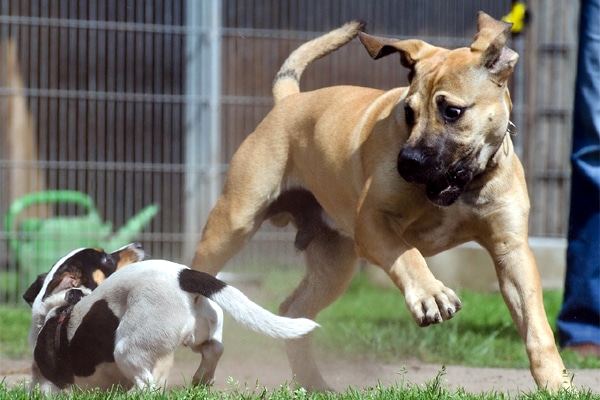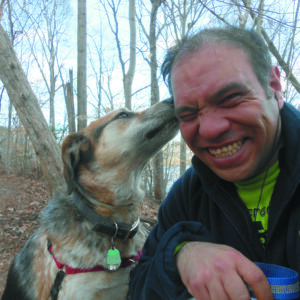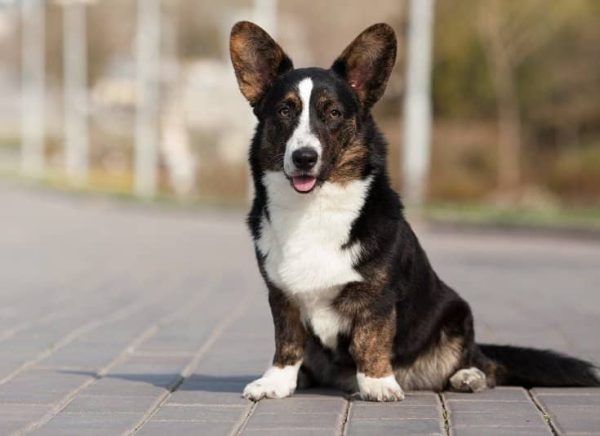Why are dogs like chickens? That may sound like the start of a clever joke or an amusing anecdote, but it’s a serious question that concerns standard, observable patterns of animal behavior. For instance, the social hierarchy among chickens is known as the “pecking order.” Having had both chickens and dogs, the behaviors I’ve noticed when introducing a new personality into an established system is almost inevitably disruptive. Bringing a puppy into a senior dog’s home can cause any number of unforeseen behavioral issues in older dogs.
The phenomenon seems to be most dramatic when a very young animal is introduced where an older one has a set routine. The social hierarchy in multi-dog households plays out in ways that dog owners can start to take for granted over time. When feeding time comes around and the dogs’ bowls are in the same room, or, in close proximity within the same room, one dog tends to eat first. Over time, these patterns become anticipated by both dogs and owners. In single-dog homes, with no competition for attention or affection, the routines can become calcified even faster.
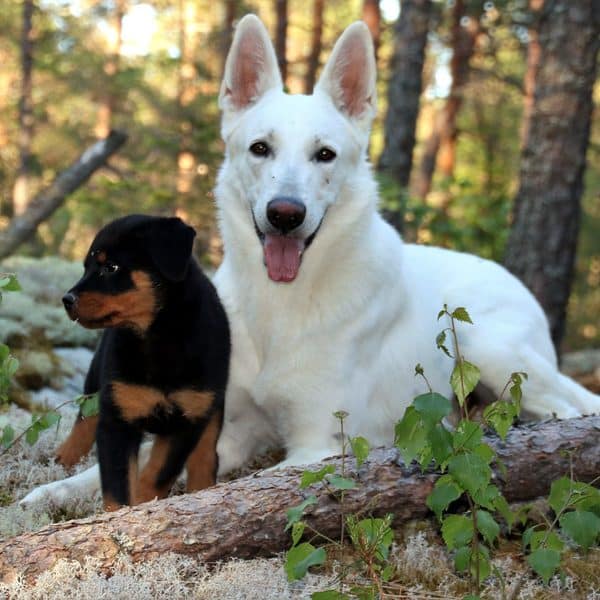
When a new puppy comes home, be it for puppy-sitting, a limited-time foster, or as a permanent addition through adoption, what are the reasons why established dogs can seem to overreact? A reliably calm, even sedentary, older dog might begin to show signs of:
- Fear
- Aggression
- Depression
- Anxiety
Let’s explore the reasons why older or senior dogs might start to manifest these reactions when a baby puppy enters their space!
Why would adult dogs fear puppies?
People who have had a dog for a number of years, may feel equipped to anticipate the dog’s entire range of reactions. Introducing a puppy, though, marks a permanent shift in the household dynamic. For an older dog, this can be an unsettling, if not shocking, development. Older, established dogs get accustomed to their routines. The attention they are used to getting, especially over the course of years, from exercise to couch time with their owner, once as reliable as their meal times, is going to be different with a new puppy. Fear is one natural response to unnatural situations.
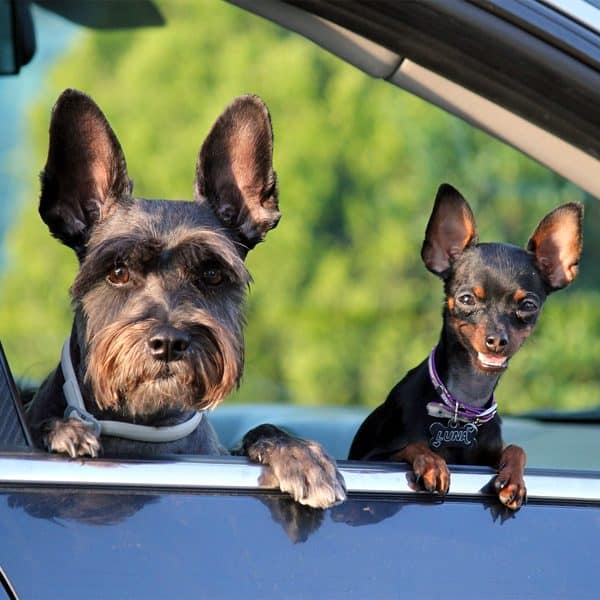
It’s easy to understand why dog owners might be confused when they notice an unusual, constant change to an older dog’s behavior. Fear reactions might manifest in hiding, whining, lack of sleep, refusal to eat, or sudden, startled movements in the older dog. If the dog has become sedentary in their dotage, a bouncy, nippy puppy makes for a startling shift in the way things have always been done. An older dog can take puppy energy quite badly when it’s introduced without sufficient prep time.
Aggression between mature dogs and puppies
Dogs are as much individuals as any other animal, and where one dog might be fearful of a new element introduced into their domain, another might get territorial and protective of what they consider their rightful space. Having a strange, young pup in their space, even the most staid and placid dog might forcefully resist what they perceive to be an intruder. The malice, mistrust, and aggression of dogs has familiar signposts: snarling or growling, voluble barking, even pouncing or biting.
Destructive behaviors that owners assumed their dogs had left behind with their own puppyhood — digging, chewing furniture or other household items — can resurface as avenues of release for animals whose routines are upset. Should the clash of dog personalities become daily, hourly, or constant mode of interaction between an older dog and new puppy, it can make for a tumultuous domestic existence.
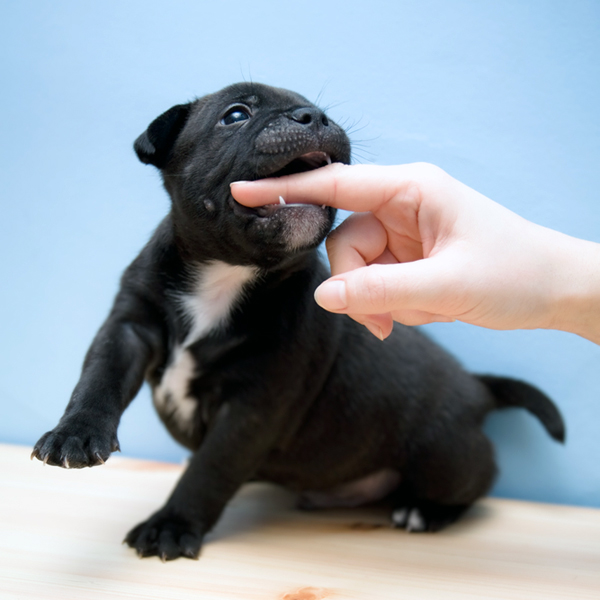
Depression when senior dogs meet puppies
Those of us who grew up with siblings know what it’s like when the house welcomes a new child. The newcomer necessarily brings with it a division of attention from parents and caregivers. The phenomenon is observable in adult dogs as well. In some cases, couch time, play time, or a walk to the park used to be the province of a single dog. In others situation, two or more dogs may have grown up together and become accustomed to their allotment of ear scratches and belly rubs.
The demands a new puppy makes on dog owners’ time and attention means less for the longtime resident. Even if the owner doesn’t love their older dogs any less, the dogs themselves may perceive new limitations on attention as loss of affection. Humans who once showed their favor to the older dog are now awed and cooing over the puppy. Should these minor slights persist over time, the adult dog can become sullen, sulky, and less engaged.
Anxiety in older dogs
We have all at least heard about, if not directly experienced the effects that separation anxiety has on our dogs. Even if the puppy was adopted as a means to provide companionship or spark increased socialization in an older or senior dog, the attempt might achieve the opposite result. Similar to the reasons a dog might get depressed when attention shifts to a puppy, they might start to display anxious behaviors. The signs of anxiety or general nervousness are well-known to dog owners whose pets are sensitive to loud noises, car travel, or confinement during crate training.

A dog might start engaging in physically destructive activities both inside and outside the home: chewing on furnishings, for instance, or digging in the yard. The dog could start performing repetitive or seemingly pointless actions, like pacing in a certain spot, or scratching or gnawing at a particular spot on their own bodies. Incontinence, or lack of bladder or bowel control, especially if that’s never been an issue before, could also be signs that an older dog is resistant to the presence of a new social dynamic in the home.
Manage dog socialization to minimize traumatic transitions
Dogs are creatures of habit. The longer they’re in our homes, the more settled they become in their routines, habits, and expectations. Outside of the house, owners also get used to the spectrum of ways their dogs interact with the world, including how they react to strange dogs, people, or unfamiliar situations. Regardless of a dog’s actual age, longtime dog parents can usually anticipate these temporary changes in dog behavior.
Short-term fostering or long-term adoption of a puppy, on the other hand, can introduce a cascade of unintended and unwanted changes to the household dynamic where an older dog is concerned. Unmanaged, any one of the range of reactions we’ve looked at can morph or blend with any of the others. Anger or aggression can turn into anxiety, fear into depression, or anxiety into anger, any of which will only compound both your frustration and the dog’s.

